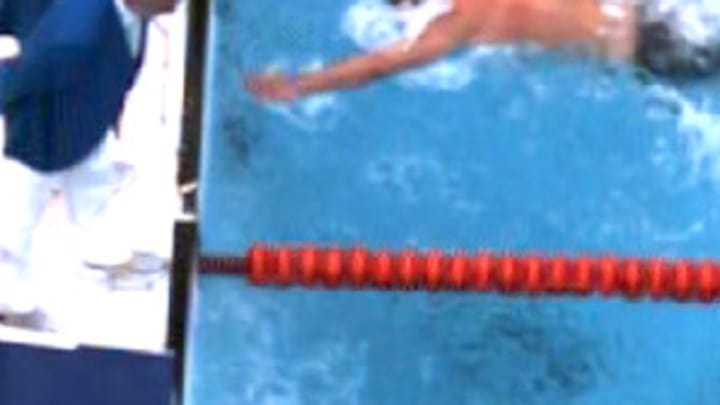Moment of the Year: Olympics

Add Michael Phelps to the list of legendary irrepressibles. Put an incoming tsunami in his lane and have a shark that missed breakfast waiting at the finish wall and he will find a way to win an Olympic swimming race. Phelps earned a share of history by snaring his seventh gold medal at the Beijing Olympics, equaling the great Mark Spitz -- a record Phelps would break one race later -- with one of the most dramatic finishes in sports history.
He teased us with the prospect of losing and pulled out the finish by a hundredth of a second, edging Serbia's game Milorad Cavic 50.58 seconds to 50.59. Never mind figurative analogies; this was a literal fingertip. Clip your nails too sharp and you might settle for silver.
For starters, Phelps was seventh at the 50-meter turn, somewhere in his own zip code, maybe in Lane 4 of the track stadium next door. Even Phelps' power-sleeping dog, Herman, had him by at least a paw and a half. Forget a gold medal; Phelps was in danger of not getting one of those blue ribbons they give to people just for showing up. With Cavic in front at 23.42, Phelps' teammate Ian Crocker, the world-record holder, was already pretty far back at 23.70. Phelps was at 24.04. In a 100-meter race, you don't overcome a six-tenth deficit at the 50-mark unless that shark takes his lunch in the other lanes.
Was Phelps worried? Not in the least. He was far down at the last Olympics when Crocker seemed headed for sure gold -- and still won that race by four-hundredths. "I knew I had to be within half a bodylength at the turn," Phelps said. "I race against Crocker all the time. He has front-half speed. If I had half a bodylength, I knew I would be fine. When I saw Crocker at the turn, I knew Cavic would be somewhere with him. I could sort of see him out of the corner of my eye."
In fact, Cavic had more than a half- body lead, but that soon evaporated. Phelps picked off one swimmer after another, until he caught Cavic at the wall. Phelps thought he had lost. "I actually did," he said later. "When I did chop the last stroke, I thought that cost me the race, but it was actually the opposite. If I had glided, I would have been way too long. I took short, faster strokes to try to get my hand on the wall. I ended up making the right decision. It turned out to be in my favor." When Phelps turned to look at the scoreboard, he punched the air with his left hand and then the water with both hands.
The finish was so close that the Serbian coaches initially filed a protest, something the gracious Cavic had initially asked them not to do. When the officials watched the frame-by-frame replay of the finish with officials from FINA, they agreed with the timing device.
A day earlier, Cavic told reporters it would be good for swimming if someone took Phelps down. Bob Bowman, Phelps' coach, strategically fuels his protégé with comments of doubt that charge his batteries. Bowman had the comments handy for 12 hours, but saved them until just before the race, when he showed them to Phelps.
"When people say things about that, it just fires me up," Phelps said. "It was like the 400 free relay. One of the French swimmers (Alain Bernard) said something to get us going. We use things like that, comments like that to fuel us, to get us even more excited. That's what Americans do. We rise to the occasion. When Bob first told me that, I said, 'Okay, we're going to let our swimming do the talking.' I'll always welcome comments like that. Anyone who wants to say something, I like it. It definitely motivates me."
After the race, Australia's Andrew Lauterstein, who won bronze in the race, proclaimed Phelps, "Simply other-worldly. When you see his arms flapping [on the starting blocks], it really gets your heart racing." After the awards ceremony, Lauterstein cracked Phelps up when he told him, "I can't believe I'm crying, and it's the American national anthem." On the podium, Lauterstein said he told himself, 'Enjoy this moment. You're standing next to the world greatest swimmer, one who's re-created history.'"
This story was originally published on Aug. 16.

Brian Cazeneuve has covered Olympic sports extensively for many years with SI and SI.com.